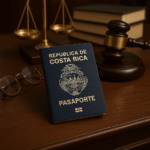Required Documents for Investor Residency Costa Rica

Costa Rica has become a magnet for foreign investors seeking residency, with its lush landscapes, stable political environment, and welcoming culture. We see a growing trend in individuals and families opting for this Central American country as their new home.
Investor residency is a pathway for foreign nationals to gain legal residence through financial investment in the country, with a minimum requirement of US$150,000 in real estate.
Proper documentation is crucial for a smooth application process. We will guide you through the necessary documents and steps to secure your residency in Costa Rica, a country that offers not just a residence but a lifestyle.
Understanding Investor Residency in Costa Rica

Costa Rica has emerged as a prime destination for investors seeking residency, thanks to its welcoming policies and diverse opportunities. The country offers a variety of residency options to suit the needs and circumstances of applicants. Among the most common options are rentista residency, designed for those with stable and sufficient income, and investment residency, tailored for individuals who wish to contribute to the country's development through business investment.
What is Investor Residency?
Investor residency is a category of residency designed for individuals who are willing to invest in the country. This can be through various means such as real estate investment, starting a business, or other investment options that contribute to the country's economic growth. By choosing this path, investors not only gain the legal right to live in Costa Rica but also contribute to its economic development.
Benefits of Obtaining Investor Residency
Obtaining investor residency in Costa Rica comes with numerous benefits. It provides the legal right to live in the country and access to its renowned healthcare system. Additionally, it allows individuals to conduct business activities, making it an attractive option for entrepreneurs and investors. The quality of life in Costa Rica is also a significant draw, with its stable political environment and natural beauty.
Investor residency also serves as a pathway to permanent residency after three years, offering additional benefits and greater stability. Furthermore, foreign residents in Costa Rica may be eligible for certain tax advantages, particularly regarding foreign-source income. This residency option also allows for the inclusion of dependent family members in the application, making it a viable choice for relocating entire families.
Moreover, having Costa Rican residency can enhance global mobility, with visa-free travel to certain countries. This is particularly beneficial for businesspeople who need to travel frequently or for families seeking educational opportunities abroad. Overall, investor residency in Costa Rica presents a compelling option for those looking to expand their global footprint while enjoying the benefits of living in a beautiful and stable country.
Investment Requirements for Costa Rican Residency
To obtain investor residency in Costa Rica, understanding the investment requirements is crucial. The Costa Rican government has established specific investment thresholds and categories to qualify for residency.
Minimum Investment Amount
The minimum investment amount for investor residency in Costa Rica varies depending on the category of investment. We will outline the specific requirements for different investment categories.
Eligible Investment Categories
Costa Rica offers various investment categories for investor residency, including real estate, vehicles, shares, and other categories. If the property is owned by a company, ownership can be proven by the means of ownership of such company's shares.
We will explore the different investment options available:
- Real estate investments are the most common and straightforward option for investor residency. You can learn more about obtaining residency through real estate.
- Investments in Costa Rican businesses can qualify, including requirements for business investments such as job creation or economic impact.
- Investments in shares of Costa Rican companies can also qualify, with requirements for demonstrating ownership and valuation.
- Vehicles such as cars, boats, or planes may qualify, with special requirements for these categories.
- Mixed investments across different categories may be combined to reach the minimum threshold.
- We will also discuss investment categories that do not qualify, helping investors avoid potential pitfalls.
When investing in a company, if the shares are not owned entirely by the main applicant, the value of the land will be prorated corresponding to his/her share ownership percentage. This allows for flexible investment options.
By understanding the eligible investment categories and the minimum investment amount, investors can make informed decisions about their investment in Costa Rica.
Required Documents for Investor Residency in Costa Rica
Costa Rica's investor residency program requires applicants to submit a comprehensive set of documents. This documentation is crucial for a successful application and subsequent residency.
Documents from Your Home Country
To start the application process, you'll need to gather several documents from your home country. These documents are essential for verifying your identity, background, and personal status.
Passport Requirements.
Birth Certificate
A copy of your birth certificate, duly authenticated, is necessary. The authentication process typically involves an apostille or legalization, depending on your country's participation in the Hague Apostille Convention.
Criminal Record Certificate
You will need to provide a criminal record certificate issued by the relevant authorities in your home country. This certificate must also be apostille according to the requirements of Costa Rican authorities.
Marriage Certificate (If Applicable)
If you are married, you'll need to provide a marriage certificate. Like other documents, it must be properly apostille.
Documents to Obtain in Costa Rica
Once you arrive in Costa Rica, there are additional documents you'll need to obtain to complete your residency application.
Passport Photos
Recent passport-sized photos that meet the specific requirements of the Costa Rican immigration authorities are necessary.
Consular Registration
Registering with the consulate of your home country in Costa Rica may be required, depending on your nationality.
Property Value Certification
If your residency application is based on an investment in real estate, you'll need a certification of the property's value from a Costa Rican notary public.
Special Power of Attorney
A special power of attorney is a critical document that allows a legal representative to act on your behalf during the application process. This document must be prepared by a Costa Rican notary public and should grant specific powers to your representative to manage your application effectively.
The special power of attorney is particularly useful for applicants who cannot be present in Costa Rica throughout the application process. However, it's essential to understand the limitations of this document and the actions that still require your personal presence.
Document Authentication Process
To successfully apply for residency in Costa Rica, understanding the document authentication process is essential. This process involves two main components: obtaining an apostille for your documents and translating them into Spanish by an official translator.
Apostille Requirements
The first step in authenticating your documents is obtaining an apostille. An apostille is a certification that verifies the authenticity of a document, making it valid for use in foreign countries that are part of the Hague Apostille Convention. For Costa Rica residency, documents such as birth certificates, marriage certificates, and police records require an apostille. You can learn more about the apostille process and how it applies to your residency application.
Translation of Documents
All documents not in Spanish must be translated by an official translator in Costa Rica. This requirement is strict, and translations done outside of Costa Rica, even by certified translators, are generally not accepted for immigration purposes. The process involves finding an official translator in Costa Rica, who will not only translate the documents but also certify them with an official stamp and signature.
It's crucial to follow the proper procedures for document translation to avoid delays or rejections in your residency application. Our firm can assist with this step, ensuring that your documents are translated and certified correctly.
Application Submission Process

Upon filing your application with the Immigration Authorities, additional requirements must be met to progress your residency application. At this stage, the applicant and their dependents, if any, are required to undergo fingerprinting at the Ministry of Security.
Preparing Your Application Package
Before the fingerprinting process, it's essential to ensure that your application package is complete and accurate. This involves gathering all necessary documents, including those from your home country and those to be obtained in Costa Rica, and having them properly authenticated and translated if necessary.
For more information on whether residency in Costa Rica is worth considering, you can visit our page on the benefits of Costa Rican residency.
Fingerprinting and Background Check
Fingerprinting is a mandatory step for the main applicant and all dependents aged 12 and older. This process initiates a local investigation to verify that the applicant has a clean criminal record and triggers an international search through INTERPOL.
The fingerprinting process requires a form pre-approved by the Ministry of Security. Our firm will guide you through this step at the Police Headquarters, ensuring that the process is handled efficiently.
The background check is a critical component of the residency application process. It not only involves local authorities but also requires coordination with international bodies like INTERPOL to conduct a thorough check.
The timeframe for completing the background check can vary, and it's a significant factor in determining the overall processing time for your residency application. If any issues are discovered during this process, we will work with you to address them and find a resolution.
It's worth noting that fingerprinting requires physical presence in Costa Rica. However, this can be scheduled to coincide with other necessary in-person requirements, making it more convenient for applicants.
Post-Application Requirements

Upon obtaining investor residency in Costa Rica, there are several key requirements to be aware of to maintain your status and potentially transition to permanent residency.
Registration with Costa Rican Social Security (CCSS)
One of the critical post-application requirements is registering with the Costa Rican Social Security system (CCSS). This is a mandatory step for all residents, as it ensures access to the country's healthcare services. Registration with CCSS is also a requirement for maintaining your residency status.
Maintaining Your Residency Status
To keep your residency status valid, you must comply with certain conditions. Firstly, you are not allowed to be absent from Costa Rica for more than six consecutive months. Prolonged absence can lead to the cancellation of your residency status. Additionally, you are required to prove that you have converted the minimum required income (US$1,000.00) into Costa Rican colones through the national banking system before each anniversary of your residency grant. This demonstrates your commitment to integrating into the local economy.
It is also crucial to keep your residency documents up to date. This includes renewing your residency card before it expires. Failure to do so can result in penalties and potentially jeopardize your residency status. For more information on the renewal process, you can visit https://www.jaroscr.com/investor-renewal/.
After fulfilling the temporary residency requirements for three years, you may be eligible to apply for permanent residency. To make this transition, you must meet the necessary criteria, which include maintaining a clean record and continuing to meet the financial requirements. Permanent residency offers greater stability and flexibility, as it is not subject to the same renewal conditions as temporary residency.
Other obligations of residents include maintaining CCSS payments and reporting any significant changes in circumstances to the immigration authorities. By fulfilling these post-application requirements, you can ensure a smooth and compliant residency experience in Costa Rica.
Conclusion
As we've explored throughout this article, Costa Rica's investor residency program offers a unique blend of quality of life and business opportunities. The program is characterized by its reasonable investment threshold and straightforward requirements, making it an attractive option compared to similar programs in other countries.
To ensure a smooth application process, it's crucial to properly prepare, authenticate, and translate the required documents. This attention to detail is vital for successfully navigating the application process. The benefits of investor residency in Costa Rica are multifaceted, including a high quality of life, numerous business opportunities, and a pathway to permanent residency after three years.
Moreover, maintaining investor residency status can eventually lead to citizenship options for those who meet additional requirements. For prospective applicants, seeking professional assistance can be invaluable in navigating the complexities of the application process. At Jaros CR, we have a proven track record of helping investors achieve their goals; you can read some of our success stories.
For those considering investor residency in Costa Rica, we recommend reaching out to experts who can guide you through the process. If you're looking for additional assistance with your application, please don't hesitate to contact us at www.jaroscr.com, info@jaroscr.com, or +(506) 71828969. We are committed to helping you achieve your goals in Costa Rica.


